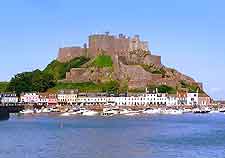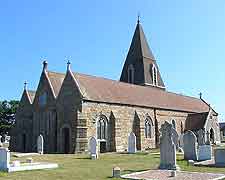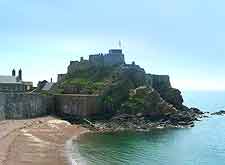Jersey History Facts and Timeline
(Jersey, Channel Islands, British Isles)

The island of Jersey is steeped in history that dates back to prehistoric times. Some impressive ancient remains have been found, including a burial chamber at La Hougue Bie. These earliest settled communities probably traded with Brittany in Northern France, as well as with southern England.
Sixth-century Jersey saw the arrival of Christianity. The island was home to St. Helier, a famous hermit who preached here and is believed to have been murdered by pirates.
Early History
From the 10th century, Jersey was annexed to Normandy. The Normans had a great affect on the island and Jersey remained under their control for nearly three centuries. Then, in 1204, King John lost control of his Normandy territory and the island had to choose between allegiance to nearby
France or
England, to the far north.
Along with the other Channel Islands, it chose to follow England. Unfortunately, this often led to Jersey clashing with its very near neighbour. Defensive fortifications were built all over the island. They included Mont Orgueil Castle, which was constructed on the orders of King John. In 1461, French troops took control of Mont Orgueil Castle, using it as their base for ruling the island until 1468.

From the 16th to the 18th Century
In the 16th century, Elizabeth Castle was built to defend the town of St. Helier, which was then growing at a rapid rate. A new fortress was also built to protect St. Aubin's Bay. An island militia was organised and a rule was made stipulating that each parish had to be in possession of two cannons. These were usually housed within the parish church.
In the 17th century, the knitwear industry grew apace in Jersey, while fishing also became an important activity. The island's fishermen even travelled as far as the Newfoundland waters. Their boats left the English Channel in March and returned in October time.
During the English Civil War, the island favoured the Royalists and the future King Charles. In 1651, it was finally captured by the Parliamentarians. In 1664, one local family, the Carterets, were rewarded for their fierce support for the royal cause. They were awarded a portion of land in America - it was to become known as
New Jersey.
18th-Century History Onwards
In the 18th century, Jersey became embroiled in a period of political tension between England and France. Consequently, the island was almost constantly held in a state of military alert. In particular, further fortifications were built to defend the island against the French. These took the form of Martello towers. However, they weren't always successful.
The American Wars of Independence led to two invasions of the island. The first was in 1779 and was unsuccessful. The second, just two years later, resulted in the capture of St. Helier. Victory was, however, quite brief. Until this point, Jersey had been oriented towards French culture and language. Following the French Revolution and the Napoleonic Wars, however, this changed, with the English language and culture prevailing. In 1814, a military fortress was built. Known as Fort Regent, it overlooks St. Helier.
In 1902, the first Battle of Flowers was held. This flower parade took on a more glamorous side in the 1950s, when various stars of stage and screen were chosen to take part.

German Forces Arrive
During World War Two, Jersey was demilitarised. Two weeks later, German forces invaded and some 8,000 people travelled to England. Of those that were left behind, over 1,000 were deported to German camps. German fortifications were quickly built on the island, the remains of which are still very evident today. In May 1945, German rule of the island ended and Liberation Day is re-enacted here each year.
The 1960s saw the rise of Jersey as a centre for the finance industry. This was also a time when the island became popular with visiting tourists. In 1981, Jersey hit the headlines thanks to the exploits of a fictional detective. 'Bergerac', starring John Nettles, was a television hit until 1991, when the final episode was screened.
 The island of Jersey is steeped in history that dates back to prehistoric times. Some impressive ancient remains have been found, including a burial chamber at La Hougue Bie. These earliest settled communities probably traded with Brittany in Northern France, as well as with southern England.
The island of Jersey is steeped in history that dates back to prehistoric times. Some impressive ancient remains have been found, including a burial chamber at La Hougue Bie. These earliest settled communities probably traded with Brittany in Northern France, as well as with southern England.
